Afghan Witness has been monitoring the education system under the Taliban since their return to power last August – keeping track of changes, verifying events using open source (OSINT) methods where possible, and speaking to sources in-country to find out the reality on the ground.
Below is an overview of our research.
Closure of girls’ secondary schools and Taliban U-turn
So far, the most defining event of the Taliban’s return to power has been their move to close secondary schools for girls, which has drawn global condemnation. After months of promises, on March 21, the hopes of teenage girls were briefly raised when the Taliban leadership announced that high schools would reopen for all students on March 23.
On the morning of March 23, as girls in various locations around the country prepared to attend their first classes in months, the Ministry of Education backtracked on their decision, announcing that all girls’ secondary schools – beyond grade 6 – would remain closed indefinitely until a policy was formulated in accordance with “Sharia and Afghan” culture.
The U-turn on girls’ schools made global headlines, with images of girls in tears circulated on social media. One tenth grade student Afghan Witness (AW) recently spoke to described it as “the most bitter experience of my life”.
A video published by Aamaj News on March 23 showed girls arriving and gathering outside Zulaikha Female High School in Kabul whilst Taliban men stood at the door, preventing them from entering. Screenshots from the footage, which has been verified and geolocated, can be seen below:
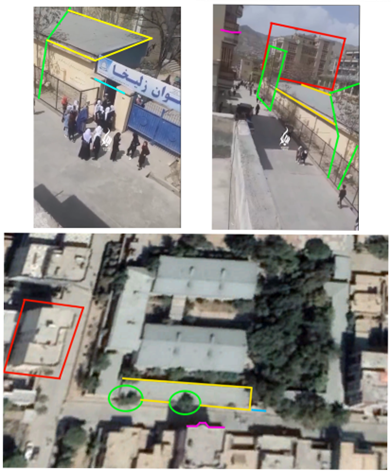 Geolocation of the video showing Taliban men preventing female students from entering the Zulaikha Female High School in Kabul on March 23 [34.577447, 69.129988]
Geolocation of the video showing Taliban men preventing female students from entering the Zulaikha Female High School in Kabul on March 23 [34.577447, 69.129988]
Over the following days, many protests erupted around the country and abroad, and, in response to the restrictions, alternative methods of learning and teaching have also been established. Some girls have turned to online schooling, however, an online teacher we recently spoke to raised the issue of a lack of internet access for girls in remote areas. Some private centres have reportedly continued operating, while there have also been reports of ‘secret schools’ set-up behind closed doors.
Organisations such as Pen Path claim to have arranged secret and online schools for 5,300 girls in Afghanistan, while the Yalda Hakim Foundation, which also provides education opportunities for Afghan girls, has been counting each day the schools are closed in a bid to raise awareness of the situation.
At the end of May, it was reported on social media that some girls’ schools had started to reopen enforcing the hijab decree. On May 23, images circulated on Twitter showing girls on their way to school in Balkh, fully covered. The images, seen below, have been verified and geolocated:
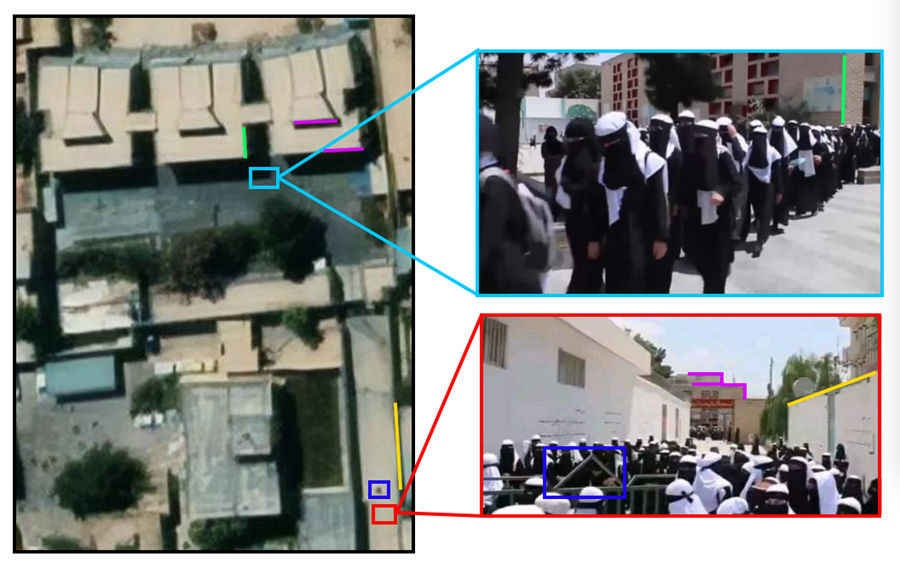 Geolocation of the girls’ high school in Balkh, where girls attended fully covered on May 23 [36.705297, 67.107380]
Geolocation of the girls’ high school in Balkh, where girls attended fully covered on May 23 [36.705297, 67.107380]
Despite the reopening of some girls’ high schools, the majority remain closed, and there has been no indication of when they will reopen. In mid-July, a fake Ministry of Education press release made international headlines after claiming that girls’ schools would reopen imminently, but was later denounced as false by several Taliban-linked Twitter accounts.
Some Taliban officials have hinted at the negative effects of the closure of girls’ schools in the long-run, and experts and rights groups suggest a likelihood of “deep divisions” on the issue. At the beginning of August, Maulawi Ahmed Taqi, a spokesperson for the Taliban’s Ministry of Higher Education, pointed out that restrictions on girls’ high schools will become a de facto ban on university degrees for women if it stays in place. “Automatically if we do not have high school graduates, we won’t have new female university students anymore,” Taqi said, adding that he is “hopeful” the Ministry of Education will reopen the schools soon.
Some religious scholars have argued for the re-opening of girls’ schools. The Assembly of Religious Scholars in Afghanistan issued a statement in mid-April this year calling for the restrictions on girls’ secondary education to be lifted. Influential Afghan cleric Sheikh Rahimullah Haqqani – who was reportedly killed by an ISKP-claimed attack on August 11 – also shared decrees from earlier scholars and accounts from the life of the Prophet Muhammad, and previously told the BBC that there is “no justification in the sharia [law] to say female education is not allowed.”
Women allowed to study, but under gender segregation rules
Unlike during the Taliban rule of the 1990s, women are able to attend university this time around, however, in February, when Afghanistan’s main universities opened their doors again, they did so with gender segregation rules in place, which naturally saw fewer women return to their studies. In April, the Taliban’s Ministry of Higher Education took the rules one step further again, announcing that male and female students could only attend university on separate days. Several professors criticised the decision, citing a lack of staff to manage the increased teaching hours, as each lesson would need to be delivered twice, once for male students and another time for female students. Professors stressed that they were already under strain due to a shortage of staff since many left the country following the takeover.
The restrictions imposed upon women more broadly have also posed further obstacles to female students and higher education staff. In December, a decree issued by the Taliban’s Ministry of Promotion of Virtue and Prevention of Vice, announced that women travelling for more than 45 miles (72km) should be accompanied by a close male family member. In February, female students told Rukhshana media that they are not allowed to travel without a Muharram (male guardian) and cannot attend university in other provinces as a result of the restriction.
In May, a Taliban decree ordered women to cover their bodies and faces in public – a move that was seen as a return to the group’s signature policy of the 1990s. The extent to which these regulations have been enforced is not clear, but following the announcement of the hijab decree, several news outlets reported incidents where female university students were allegedly beaten or denied entry for wearing colourful clothes or the “wrong” type of covering.
On May 18, it was reported that female students were denied entrance to the Kabul Education University, also known as Shahid Rabbani Education University, for wearing colourful headscarves. Footage of the incident was shared online, which AW was able to verify and geolocate:
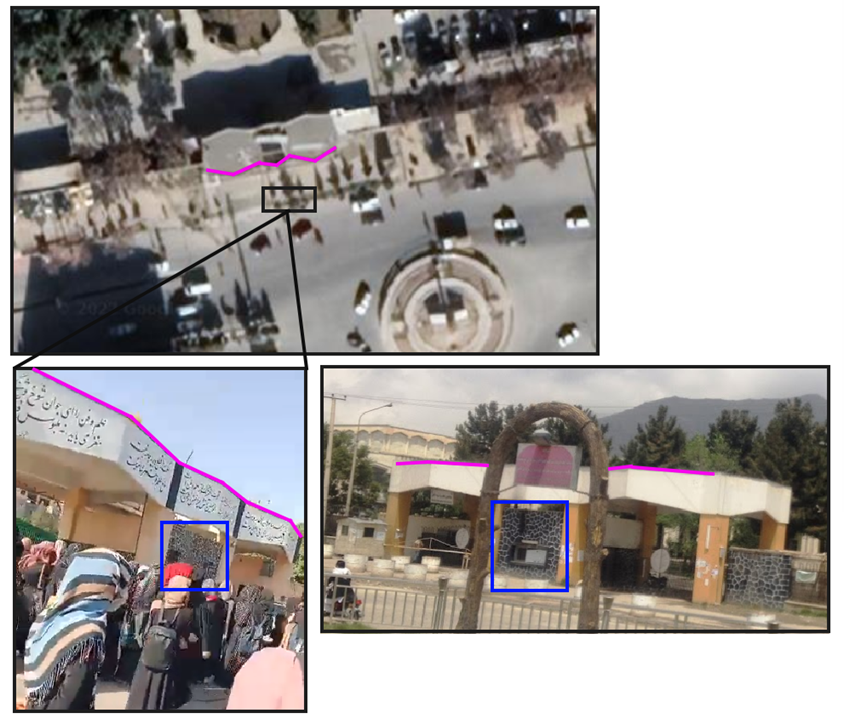 Geolocation of the Taliban denying access to female students attending the Kabul Education University in Kabul [34.531331, 69.112972]
Geolocation of the Taliban denying access to female students attending the Kabul Education University in Kabul [34.531331, 69.112972]
University students in multiple provinces who AW spoke to in March raised similar issues. One student in Balkh University says she and classmates heard a girl “screaming loudly” while being “punished for not complying with the authorities’ rules on hijab.” Another student in Kabul says Taliban authorities often warned students through their department and faculty officials that if they did not observe “full hijab”, they would close the universities to female students again, while a student from Samangan University told us students were instructed by Taliban authorities to wear long black robes, completely cover their faces – including eyes – and not wear high heels and colourful clothing.
Staff face restrictions, reports of Taliban controlling hiring process
While experts say Afghanistan is already facing a brain drain, the staff shortage has been exacerbated by the segregation of male and female students and staff, as classes must now be taught twice. Although there is an obvious need for new staff members, the Taliban appear to be taking measures to ensure the values of staff align with their own. According to reports, the Taliban have made it compulsory for private universities to request permission before hiring new professors and have urged higher education institutes to “seriously examine the professors’ past” and prevent the promotion of the current members of staff who don’t fit their ideals.
AW was also told by sources, including a member of staff and a student at Balkh University, that the Taliban has formed a special committee entitled ‘Call and Guidance’ at Balkh, Samangan, Parwan, Jawzjan, and Sar-e-Pul universities, headed by Taliban mullahs. The member of staff contacted by AW claims that the director of this new committee emphasised the importance of the implementation of Islamic and religious guidance to ensure compliance with Islamic principles in both public and private higher education institutions. On May 26, Alisher Shahir, a journalist covering Afghanistan, corroborated the claims gathered by AW sources regarding the formation of new committees in universities.
The Taliban have also reportedly dismissed dozens of university professors, mainly targeting ethnic minorities. A report in April claimed that Abdullah Safi, the Taliban representative at Balkh University, terminated the employment of 50 professors at the university based on their ethnicity. A list containing the names of all the dismissed faculty members was also shared by a journalist on Twitter, and an AW source – a civil activist in Balkh – confirmed the news.
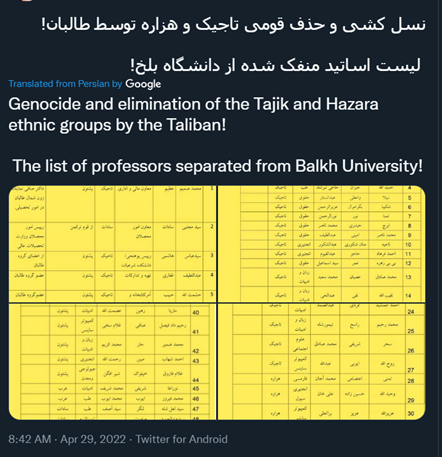 Printscreen of tweet by journalist, containing images of the names of professors reportedly dismissed by Taliban.
Printscreen of tweet by journalist, containing images of the names of professors reportedly dismissed by Taliban.
In extreme circumstances, violence against staff has also been reported. There have been several reports of professors and teachers being detained by the Taliban, including the high profile case of Ustad Faizullah Jalal, a professor at Kabul University, who was arrested in January after allegedly publicly criticising the Taliban on Twitter and television. There have been numerous other reports of professors and teachers being arrested for their alleged criticisms of the Taliban, or in some cases, alleged affiliations with the National Resistant Front.
While these cases relate to male staff, female lecturers have faced similar restrictions to their students, and have reportedly been prevented from participating in scientific conferences with their male counterparts. Despite the Taliban’s rules on gender segregation in universities, in some cases, male lecturers still teach female students due to the shortage of female academic staff – a result of many professors leaving the country. According to a BBC report in February, since the takeover, 229 lecturers from the three major universities of Balkh, Herat and Kabul left the country – with 112 resigning from Kabul university alone.
Islamic modules increased, reduction of core subjects
Several examples of content restriction have been recorded since the Taliban’s return to power. There have been various reports of university departments being removed, accompanied by a reduction of core subjects whilst the number of credits for Islamic content has reportedly increased – something verified by AW sources, including professors in public and private universities in Balkh. Some university students have also reported mandatory religious lessons outside of the curriculum.
There have also been reports that the Taliban have damaged and removed previous student work, and in March, it was reported that the Taliban had covered – and later removed – a statue commonly referred to as the “Mother’s Statue” in front of the Faculty of Fine Arts at Kabul University.
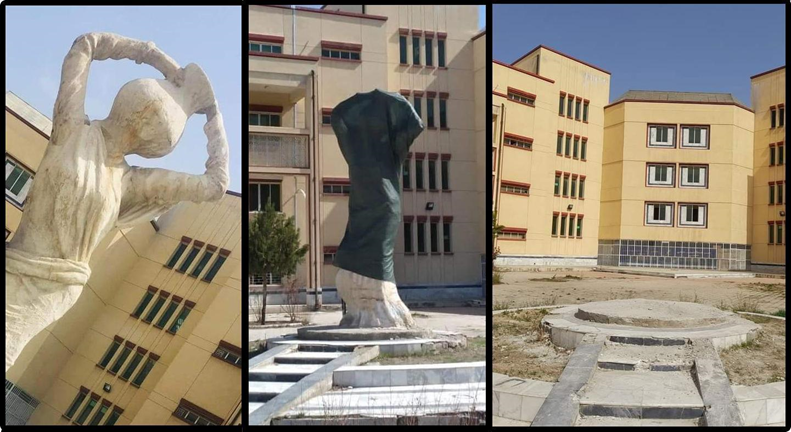 The progression of censorship of the Mother’s Statue in Kabul University [34.513440, 69.131730]
The progression of censorship of the Mother’s Statue in Kabul University [34.513440, 69.131730]
Nationwide push to open madrasas
While girls’ high schools remain closed, there has been an apparent push by the Taliban to open madrasas across Afghanistan. On April 24, Noorullah Mounir, the head of the Taliban’s Ministry of Education, attended a rally in Logar province where he announced plans to establish up to ten new religious schools in all districts of the country. In recent months, several reports have emerged of the Taliban opening new religious schools across Afghanistan, which are focused on the Taliban’s understanding of Islamic teachings.
AW has verified several reports of buildings being repurposed as religious schools, including the Adbl Hai Habibi High School, Khost, and a former Mitra TV broadcast building in Mazar-i-Sharif, Balkh Province.
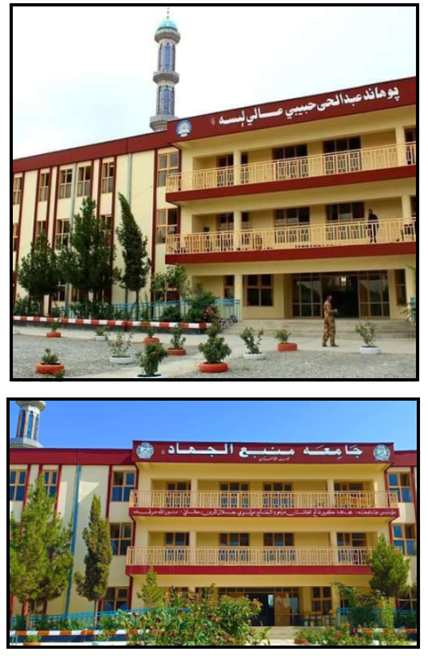 Before (top) and after (bottom) the name change of the Abdul Hai Habibi High School into a madrasa [33.338512, 69.917157]
Before (top) and after (bottom) the name change of the Abdul Hai Habibi High School into a madrasa [33.338512, 69.917157]
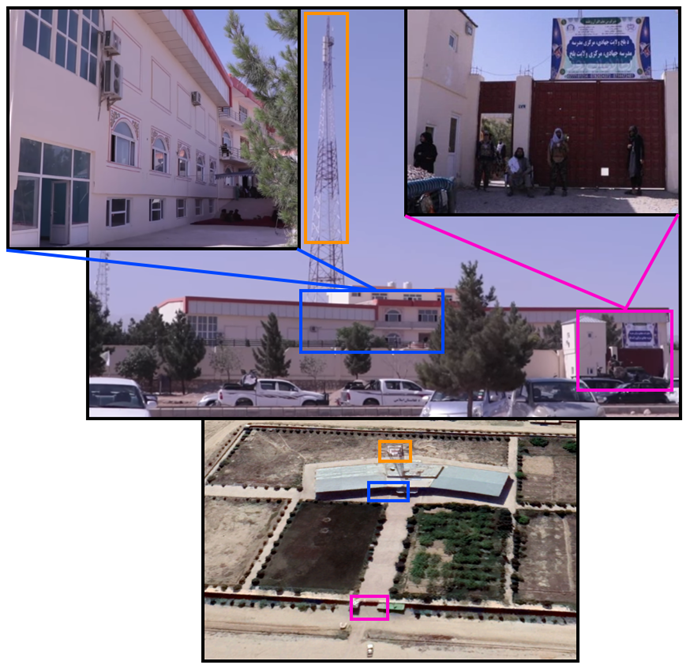 Geolocation of the TV building converted into a religious school in Mazar-i-Sharif, Balkh province [36.66776, 67.13138]
Geolocation of the TV building converted into a religious school in Mazar-i-Sharif, Balkh province [36.66776, 67.13138]
There have also been claims of schools being used as Taliban bases, which AW has found some evidence for. Below, two frames of a video posted on Twitter on October 11, 2021 can be seen, showing several Taliban men at the Bibi Amina Girls’ High School. The image below is the geolocation of the school, in the village of Bazarak, Panjshir province.
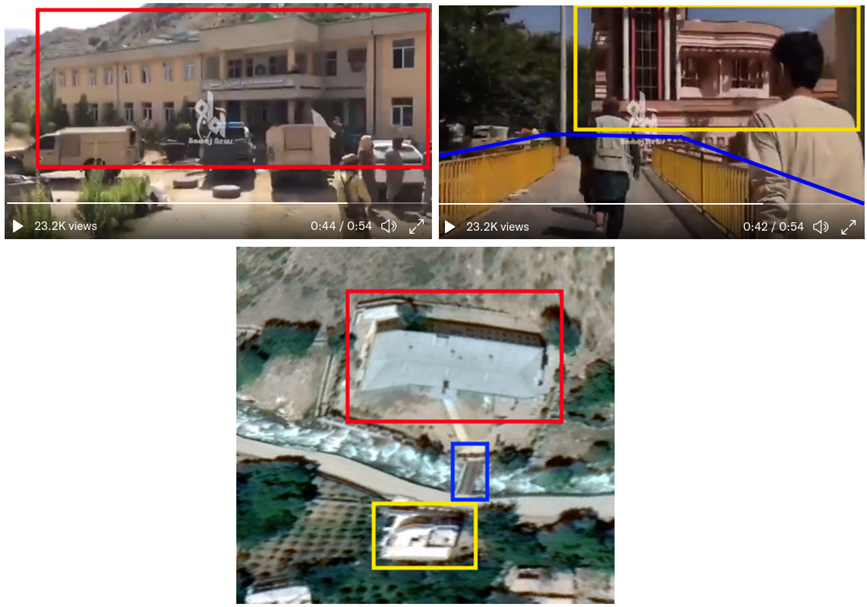 Geolocation of the Bibi Amina Girls’ High School, taken over by the Taliban in October 2021 [35.314666, 69.513043]
Geolocation of the Bibi Amina Girls’ High School, taken over by the Taliban in October 2021 [35.314666, 69.513043]
Removal of Farsi from Balkh University sign
Other examples of the Taliban’s management of educational institutes include reports of the Taliban removing the Farsi words from the Balkh University sign, in what has been described as part of an “anti-Farsi sentiment”. In a news article by Paik Aftab, one unnamed student pointed out that even though the Taliban claim to have an issue with all foreign languages and are not targeting those who speak Farsi specifically, they did not erase the English from the sign – only the Farsi.
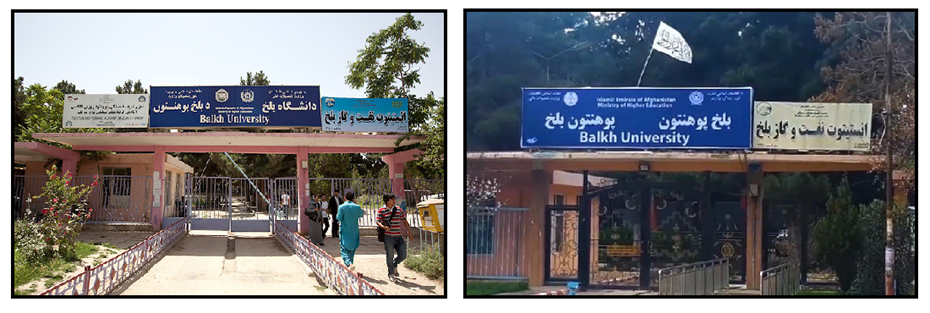 Before (left) and after (right) the sign changes at Balkh University.
Before (left) and after (right) the sign changes at Balkh University.
On March 13, an additional sign change was reported at Balkh University. On this occasion, the Taliban replaced the sign for the Faculty of Medicine with a different one displaying English and Pashto only.
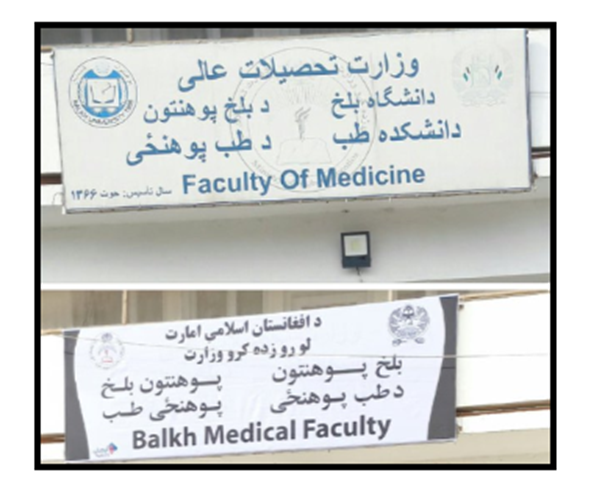 Image showing the replaced sign at the Faculty of Medicine, Balkh University. At the top the old sign with English, Farsi and Pashto, at the bottom the new sign with just English and Pashto.
Image showing the replaced sign at the Faculty of Medicine, Balkh University. At the top the old sign with English, Farsi and Pashto, at the bottom the new sign with just English and Pashto.
Looking to the future
Experts are not optimistic about the future of Afghanistan’s education sector based on the current state-of-affairs. Afghanistan is already facing a “brain drain”, and with girls’ secondary schools currently closed, there is concern over the impact this will have on women’s ability to progress to further education. While the situation remains, it is certain that those who are able to will attempt to leave the country, further contributing to the on-going shortage of professionals.
Others point out that the ideological education under the Taliban’s rule will not only increase the group’s ability to remain in power for a long time, but will also reverse the progress Afghanistan’s education sector made between the end of the Taliban’s previous rule, and their takeover in 2021.
Regardless, activists and civil society organisations continue to advocate for educational rights in Afghanistan and show no sign of stopping – even in the face of restrictions.


